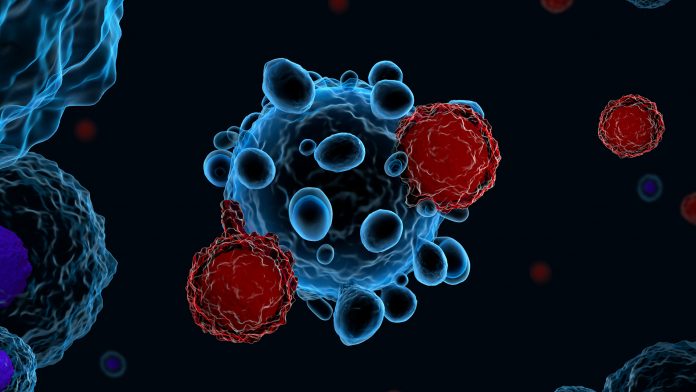
Researchers have discovered a potent biomarker for clinical responses to CAR-T cell therapy that could improve lymphoma treatment.
The findings from MedUni Vienna could provide an essential step forward in optimising CAR-T cell therapy. The results of the study were recently published in the journal Frontiers in Immunology.
Diffuse large B cell lymphoma (DLBCL) is the most common form of lymphoma (non-Hodgkin’s lymphoma). The five-year survival rates are currently between 55% and 64%. However, patients who experience a relapse of the disease, or who do not respond to combined antibody chemotherapy will have a worse prognosis.
CAR-T cell therapy could be the way forward
Over recent years, CAR-T cell therapy has emerged as a very effective form of treatment. In CAR-T cell therapy, the body’s own lymphocytes are taken, equipped with chimeric T cell receptors (CAR = chimeric antigen receptor) specific for the lymphatic cancer cells. These are then expanded and returned to the patients.
The T cells are transformed into ‘killer cells’ due to the expression of the chimeric T cell receptors. In the best-case scenario, the cells can permanently eliminate the lymphatic cancer cells in the patient’s body. While this form of therapy can be highly effective when there is a response of CAR-T cells to the lymphoma cells, the therapy does not work for all patients.
In the study, the researchers began at the point of origin for CAR-T cell production: the nature of the patient’s own T lymphocytes (T cells). The team discovered that patients with lymphoma tended to have a deficiency of T lymphocytes (T cell lymphopenia).
As lymphopenia is typically accompanied by an increase in “exhausted” T cells, the researchers decided to measure the number of these cells. They found that exhausted T cells were significantly increased in a subset of patients. These exhausted T cells are usually only found in patients suffering from chronic inflammation.
Exhausted T cells can inhibit therapy
Using these observations, the researchers created a basis for dividing patients into those with a high and those with a low probability of responding to CAR-T cell therapy.
“Our study shows how important the nature of the T cells is for CAR-T cell production and that exhausted T cells, which can be found in a considerable proportion of patients, pose a problem for subsequent CAR-T cell therapy,” says study leader Winfried Pickl.
“Our observations of the mode of action of the differently exhausted T cells, which were used as starting material for the production of CAR-T cells, show that the degree of differentiation does not have a negative influence on the direct killing of cancer cells by CAR-T cells, but it does have a negative influence on the leukaemia cell-dependent growth and the factor production of the CAR-T cells,” continued Pickl.
The findings suggest that exhausted CD27negCD28neg-CAR-T cells may not be able to persist for long periods of time in patients, which can limit their long-term efficacy.
“The low frequency of differentiated (exhausted) CD3pos CD27neg CD28neg-T cells at the time of leukapheresis represents a new blood biomarker that can be used even before the start of CAR-T cell production and infusion and predicts the response to treatment with CAR-T cells in patients. Removal of such cells from the leukapheresis product prior to the initiation of CAR-T cell production could significantly improve the success of therapy even in patients with an unfavourable initial situation,” concluded Pickl.









